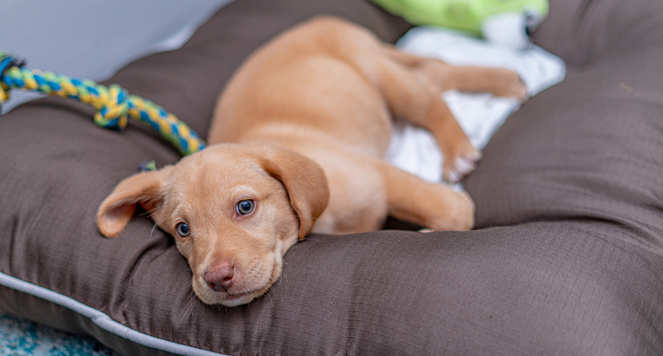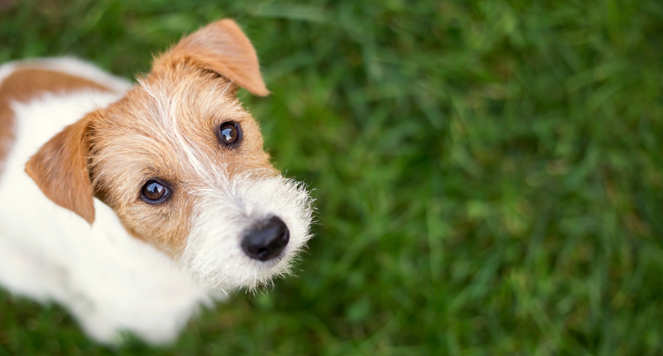Pawsitive Pups Training School
'Life Skills for Puppies' class - for puppies aged 8 - 16 weeks
How is Life Skill for Puppies different to other puppy classes?
Our Life Skills for Puppies classes place a strong emphasis on preventing common behavioural problems by teaching practical, everyday skills that fit naturally into family life. We use positive training methods to help you build a strong bond with your puppy while encouraging calm, well mannered behaviour.
Classes are suitable for puppies of all breeds aged 8 to 16 weeks, with additional classes available for adolescent puppies. Group sizes are kept small, with a maximum of five puppies per class, allowing for one to one guidance and support throughout the course.
The cost is £130 for a 7 week course, which includes weekly classes and supporting notes to help you continue training at home.
What life skills are taught?
What will my puppy learn?
Call us now to book your puppy in for Pawsitive 'Life Skills for Puppies'!
Frequently Asked Questions - General
What breeds can attend?
Any breed of puppy can attend classes.
How many puppies will be in the class?
Group sizes are kept small, with a maximum of five puppies per class, allowing for one to one guidance and support throughout the course.
What happens if the course is not filled?
The Life Skills course aims to teach your puppy how to behave around people and other dogs. If there are less than 3 puppies enrolled onto a course, the course will be postponed by one or two weeks to allow other puppies to join. This will ensure you and your puppy get the most from the 7-week course.
What does it cost?
The cost of the seven-week course is £130.
My puppy is nervous or excitable in new situations, should I bring them?
The classes will be laid out so there is plenty of room between you and the next puppy. If your puppy is struggling, visual barriers can be used to block your puppy's view of the other puppies until they have settled into the classes.
Your nervous puppy will never be made to interact with other puppies unless they want to and will always be allowed to move away if they need to.
Your excitable puppy will have closely monitored and appropriate interactions with other puppies and will be moved away before they become excited or boisterous.
How will I remember everything taught in the classes?
After each class you will be emailed class notes detailing what was covered in the class. If you have any questions, you can contact us and we will get back to you.
My puppy has not been well, can I still attend classes?
If your puppy is not well, please contact the practice before you are due to attend the class to discuss this with a member of staff.
If there are concerns, you will be asked to skip a class until you puppy is better, alternatively, if you puppy is unwell for an extended time, you may be advised to join another course, so you do not miss a large amount of the training.
Langford Small Animal Practice is a teaching Practice, will there be students in the classes?
There will be a mixture of Veterinary Surgeon students and Veterinary Nurse students attending the classes while they are on rotations gaining some practical experience.
They will be there mainly to observe the classes and will not disturb you when you are training your puppy.
You are more than welcome to chat to them and ask for help. If they cannot help, they will find our instructor to help you.
Classes
How long is the life skills course?
The course is a set seven-week course. You will be expected to attend once a week for 7 consecutive weeks to complete the course.
What happens during the 7 weeks?
The first week is an introduction to the course lasting an hour and a half, and is attended without your puppy. This will be held in Langford Vet Practice and includes refreshments.
The remaining 6 weeks are held with puppies and are each one hour in length. These will be held in the on-site training room at the practice.
What happens if I miss a class?
You will receive class notes for the class you miss, if you read through these and need help with anything you can email us and we will try to accommodate this during the next class.
In addition you can go over everything we cover throughout the course in your free “Life skills for puppies: Laying the foundation for a loving, lasting relationship” book.
Who can attend the classes?
I would encourage anyone who is going to be part of your puppy’s life to come to the classes.
Who runs the classes?
Sarah qualified as a Veterinary Nurse 2002, since qualifying, she has specialised in Animal Behaviour and holds an MSc in Clinical Animal Behaviour from the University of Lincoln.
Methods
What methods do you use?
We use evidence-based, non-confrontational methods to training your puppy and address any problems you may be having.
Each puppy and owner are different, so we aim to work with you and your puppy to make the training positive and enjoyable to you and your puppy.
What are positive training methods and why should I use them?
Positive training methods teach your puppy what to do and increase their desire to keep doing it. In addition, you will learn how to encourage your puppy to repeat those desirable behaviours instead of engaging in undesired behaviours.
We use reward-based methods during training to provide your puppy with something they want when they have showed the desired behaviour. Not only does it encourage your puppy to repeat a behaviour, but it also encourages positive interaction and a puppy who is eager to learn and do things with you.
Negative training methods are based on punishment and aversive tools, including water spray bottles, shouting at them, and rubbing their noses in a soiled area of the house, through to lead corrections, choke chains and prong collars. While punishment may stop your puppy from showing any behaviour by making it afraid of the consequences, it does not teach them what to do.
The outcome of using punishment is a feeling of fear and anxiety which leads to your puppy not wanting to be near you in the future and may lead to aggression because through these techniques you cause pain and discomfort to your puppy. In addition to causing fear and anxiety, punishment does not teach your puppy what to do.
Langford Vets are against the use of any negative training methods because there is ample research proving that these methods are not efficient in addressing undesired behaviours and damage the owner-pet relationship.
Will all training be food motivated?
When using positive based training to teach your puppy the desired behaviour and encourage it to continue, we choose a reward that motivates your puppy. While it is true that food (including treats) is highly motivating for most puppies, it is not the only available reward.
Some puppies are motivated by toys, play, affection, or praises.
Together, we identify what would work best for your pet in different situations.
Will I always have to carry food with me?
Every time you interact with your puppy, go for a walk or play with them, you have the opportunity to teach them and reward appropriate behaviour. Having small tasty treats on hand is therefore a good idea.
In the future as your puppy grows and behaviours become easier for them, you can slowly wean them off of needing a treat every time they perform a behaviour. You cannot, however, expect your puppy to work for free, so even when they are well behaved and performing cues well, they will still need the occasional treat to keep them motivated to do these things.





